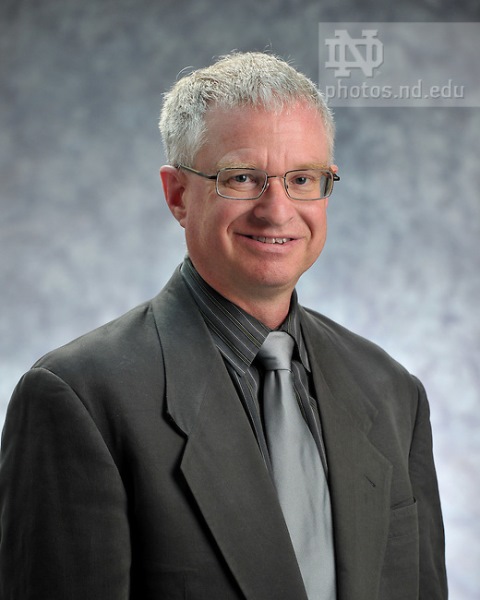Notre Dame Professor of Theology to Speak at McGee Endowed Lecture Series

Gerald McKenny photo courtesy of Notre Dame.
Follow us on Twitter: @BaylorUMedia
Media contact: Terry Goodrich, (254) 710-3321
WACO, Texas (Oct. 7, 2014) – “Changing Human Nature through Technology: So What's the Problem?" will be the topic of a lecture by Gerald McKenny, Ph.D., authority on Christian ethics and ethics of biotechnology.
McKenny will speak at the annual McGee Endowed Lecture Series hosted by Baylor University’s department of religion at 3:30 p.m. Thursday, Oct. 9, in the Miller Chapel in Tidwell Bible Building, 600 Speight Ave. in Waco.
Each year the McGee Endowed Lecture committee selects a speaker from one of four categories: ethics, Old Testament, New Testament and church history. This year’s concentration on ethics carries a special significance.
“Daniel B. McGee was an ethics professor. It’s an opportunity to honor him,” said Elise Edwards, lecturer in the department of religion in Baylor’s College of Arts & Sciences.
McGee, Ph.D., former professor and Emeritus Melton Endowed Chair of Religion at Baylor University, died in April at age 80.
“McKenny was very honored when we asked him to speak. He had known Daniel McGee and knew of his passing,” Edwards said.
McKenny is an endowed professor in the department of theology at the University of Notre Dame. He completed his undergraduate degree at Wheaton College, going on to receive his M.Div. at Princeton Theological Seminary and his Ph.D. at the University of Chicago.
“Dr. McKenny’s work asks us to question the moral purposes of medicine and technology,” Edwards said. “So many of our students are pursuing some sort of medical career that we thought it would reach all students, not just the religion majors.”
McKenny is a prolific author. From articles to book chapters, he has contributed to a copious amount of sources for Christian, biomedical, biotechnology, religious and medical ethics. In 2010 McKenny wrote To Relieve the Human Condition and The Analogy of Grace: Karl Barth's Moral Theology, considered by Oxford University Press as “the most comprehensive treatment of Barth's ethics to date.”
For more information, please contact Elise Edwards at Elise_Edwards@Baylor.edu
by Sarah Czerwinski, student newswriter, (254) 710-6805
ABOUT THE DANIEL B. McGEE ENDOWED LECTURES IN RELIGIOUS STUDIES
The Daniel B. McGee Endowed Lectures in Religious Studies series was established in 2001 by the former U.S. Ambassador to Sweden, Lyndon Olson of Waco, and his wife, Kay Woodward Olson. The lecture series was dedicated to Daniel B. McGee, Ph.D., former professor and Emeritus Melton Endowed Chair of Religion at Baylor University. McGee received his B.A. in English Literature at Furman University, a B.D. and Th.M. at Southeastern Seminary and his Ph.D. in Theological Ethics with a minor in political science from Duke University.
McGee joined the staff at Baylor University in 1966, going on to pioneer the ethics program. He taught graduate and undergraduate courses for 40 years, retiring in 2006.
ABOUT BAYLOR UNIVERSITY
Baylor University is a private Christian University and a nationally ranked research institution, characterized as having “high research activity” by the Carnegie Foundation for the Advancement of Teaching. The University provides a vibrant campus community for approximately 16,000 students by blending interdisciplinary research with an international reputation for educational excellence and a faculty commitment to teaching and scholarship. Chartered in 1845 by the Republic of Texas through the efforts of Baptist pioneers, Baylor is the oldest continually operating University in Texas. Located in Waco, Baylor welcomes students from all 50 states and more than 80 countries to study a broad range of degrees among its 12 nationally recognized academic divisions. Baylor sponsors 19 varsity athletic teams and is a founding member of the Big 12 Conference.
ABOUT THE INSTITUTE FOR STUDIES OF RELIGION
Launched in August 2004, the Baylor Institute for Studies of Religion (ISR) exists to initiate, support and conduct research on religion, involving scholars and projects spanning the intellectual spectrum: history, psychology, sociology, economics, anthropology, political science, epidemiology, theology and religious studies. The institute’s mandate extends to all religions, everywhere, and throughout history, and embraces the study of religious effects on prosocial behavior, family life, population health, economic development and social conflict. While always striving for appropriate scientific objectivity, ISR scholars treat religion with the respect that sacred matters require and deserve. For more information, visit www.baylorisr.org